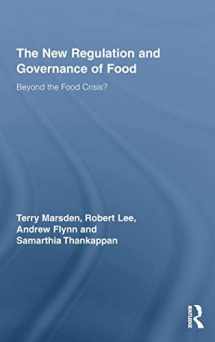
The New Regulation and Governance of Food: Beyond the Food Crisis? (Routledge Studies in Human Geography)
ISBN-13:
9780415956741
ISBN-10:
0415956749
Edition:
1
Author:
Terry Marsden, Robert Lee, Andrew Flynn, Samarthia Thankappan
Publication date:
2009
Publisher:
Routledge
Format:
Hardcover
364 pages
Category:
Environmental Economics
,
Economics
,
Sustainable Development
,
Food Science
,
Agricultural Sciences
,
Sociology
FREE US shipping
Book details
ISBN-13:
9780415956741
ISBN-10:
0415956749
Edition:
1
Author:
Terry Marsden, Robert Lee, Andrew Flynn, Samarthia Thankappan
Publication date:
2009
Publisher:
Routledge
Format:
Hardcover
364 pages
Category:
Environmental Economics
,
Economics
,
Sustainable Development
,
Food Science
,
Agricultural Sciences
,
Sociology
Summary
The New Regulation and Governance of Food: Beyond the Food Crisis? (Routledge Studies in Human Geography) (ISBN-13: 9780415956741 and ISBN-10: 0415956749), written by authors
Terry Marsden, Robert Lee, Andrew Flynn, Samarthia Thankappan, was published by Routledge in 2009.
With an overall rating of 3.8 stars, it's a notable title among other
Environmental Economics
(Economics, Sustainable Development, Food Science, Agricultural Sciences, Sociology) books. You can easily purchase or rent The New Regulation and Governance of Food: Beyond the Food Crisis? (Routledge Studies in Human Geography) (Hardcover) from BooksRun,
along with many other new and used
Environmental Economics
books
and textbooks.
And, if you're looking to sell your copy, our current buyback offer is $0.5.
Description
Major questions surround who, how, and by what means should the interests of government, the private sector, or consumers hold authority and powers over decisions concerning the production and consumption of foods. This book examines the development of food policy and regulation following the BSE (mad cow disease) crisis of the late 1990s, and traces the changing relationships between three key sets of actors: private interests, such as the corporate retailers; public regulators, such as the EU directorates and UK agencies; and consumer groups at EU and national levels. The authors explore how these interests deal with the conundrum of continuing to stimulate a corporately organised and increasingly globalised food system at the same time as creating a public and consumer-based legitimate framework for it. The analysis develops a new model and synthesis of food policy and regulation which reassesses these public/private sector responsibilities with new evidence and theoretical insights.


We would LOVE it if you could help us and other readers by reviewing the book
Book review

Congratulations! We have received your book review.
{user}
{createdAt}
by {truncated_author}


